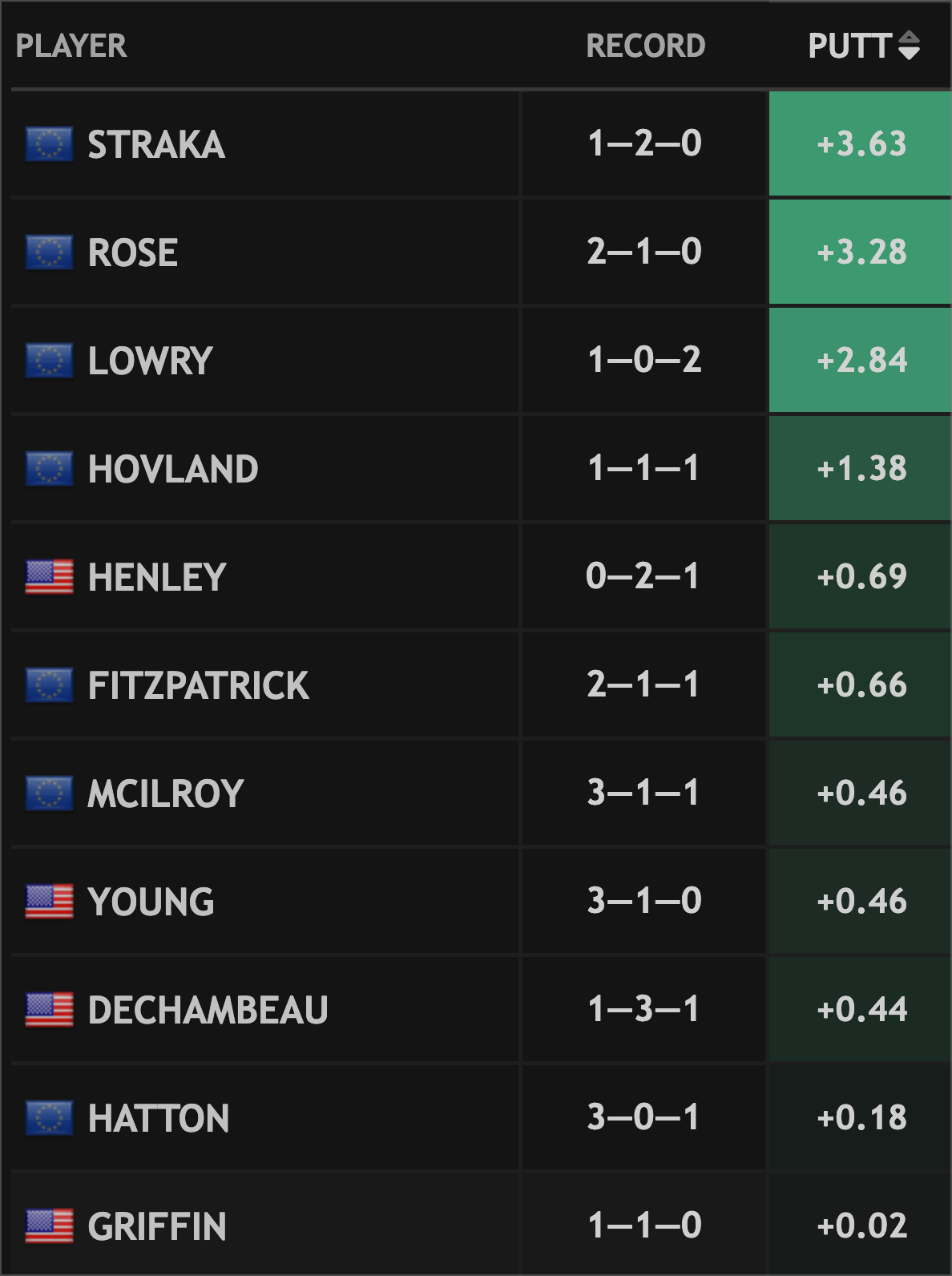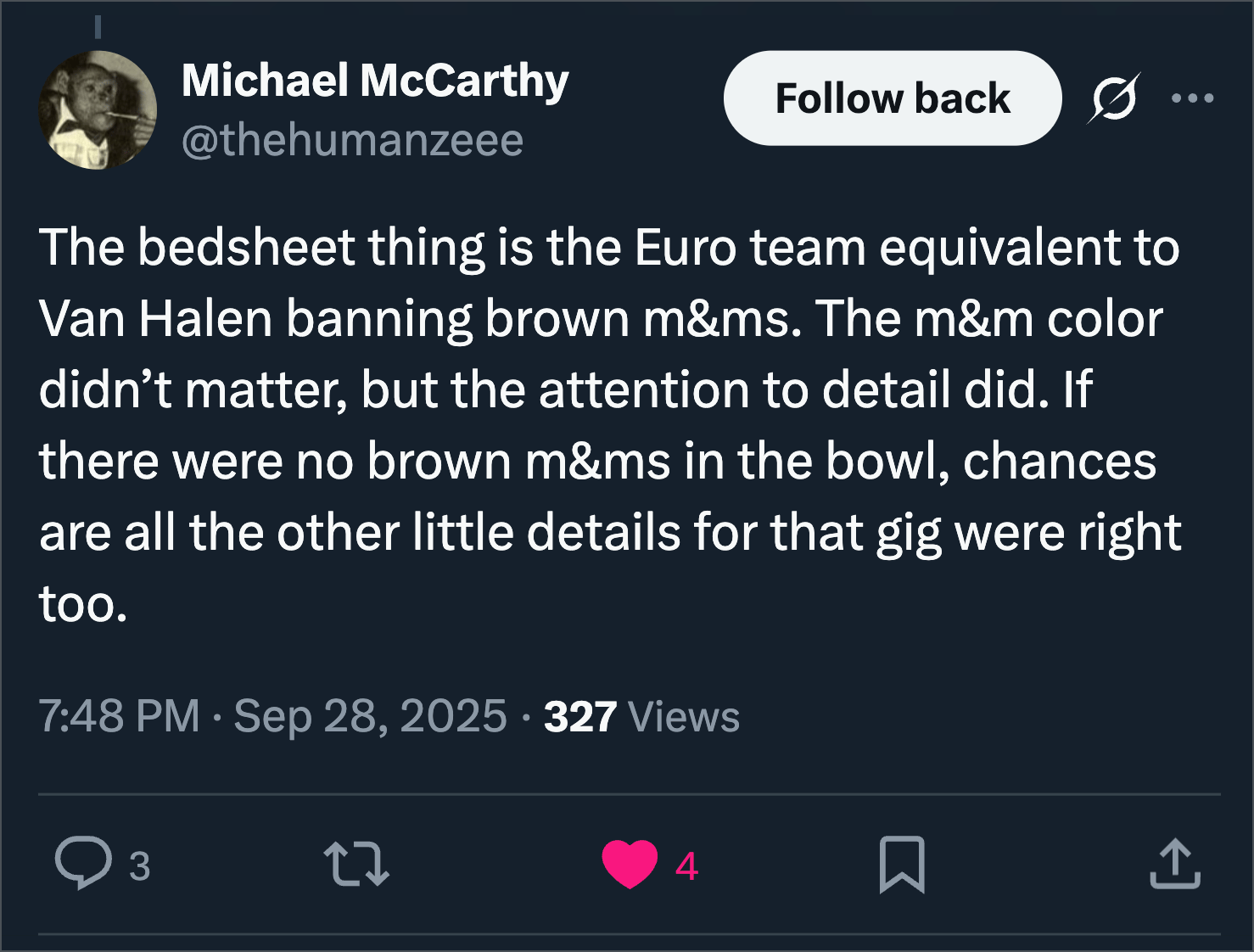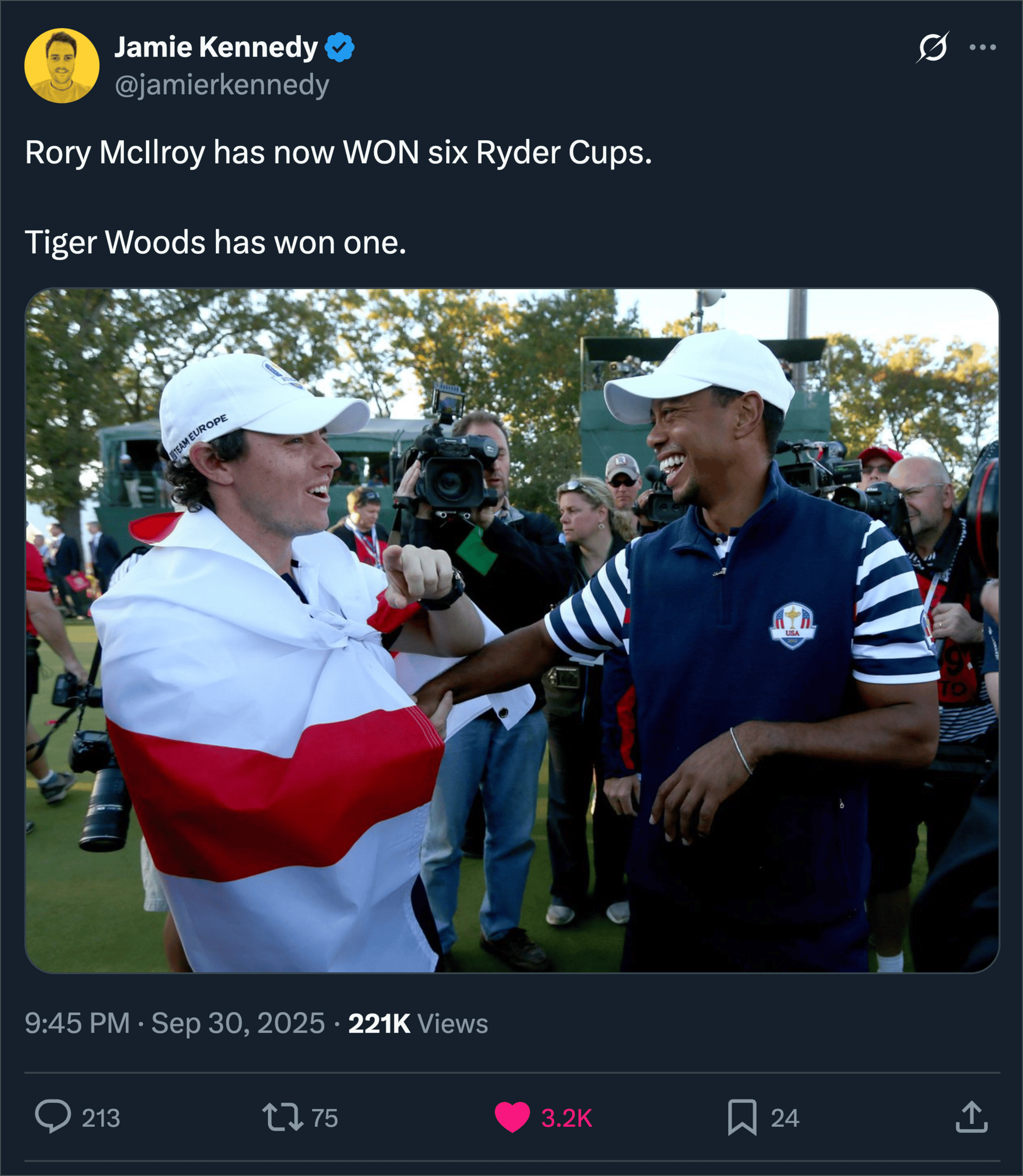

Issue No. 259 | October 1, 2025 | Read Online

A thank you to Meridian Putters for sending us to New York for boots on the ground coverage at Bethpage last week!
I am convinced that nothing else in all of sports brings about more angsty tweet threads, more think pieces and more overtorque-ing on ideas and what should be done in the future than the Ryder Cup.
[raises hand]
So here’s 4,000 words on what went wrong at Bethpage!
But first!
Thank you to OGIO for sponsoring today’s newsletter.
OGIO’s newly-launched Renegade Vault carry-on bag — featured in Jason’s incredible illustration here — was our go-to travel piece last week at the Ryder Cup. I cannot say enough great things about it.
OGIO built it because “hardside luggage has gone soft,” so if you find yourself needing to transport items as precious as the Ryder Cup Trophy and secret shampoo, Jason and I cannot recommend it highly enough.
We will actually be giving away a bag to one member of the Normal Club at the end of this week. You can get involved right here!
OK, now onto the news.
1. Here’s an admission: I had most of this written by Sunday afternoon because I thought we were getting a two-TD victory from the Euros.
Then they won just one match in Sunday singles and, as Justin Rose said, experienced some “squeaky bum time” (this is a British phrase, apparently, that absolutely upended me) as the U.S. closed in on history.
Ultimately, the Euros hung on 15-13, and the U.S. somehow got the worst of both worlds. They didn’t win, but they made it close enough that they can convince themselves that nothing is actually wrong and that they truly do just need to make more putts.
I was rooting for 21-7 because the necessity of an overhaul would have been undeniable, and I think this year’s lesson for me as it relates to the Ryder Cup is that an overhaul is what’s needed for the United States team.
2. I do not mean for any of what I’m about to lay out to sound like a pinning of the blame on a single person. It is — more than anything else — a critique of the structure of the organization as a whole than it is me trying to light up an individual or a team. I think that’s important to note because I think when you start lighting up individuals, it starts to feel personal and personal always gets in the way of progress.
I think Keegan was decent (though not amazing) given the position he was put in.
I think the players actually do care.
I think everyone involved with the PGA of America is laboring as tirelessly as possible to make all of this work.
3. Let’s begin with the Europeans. They have built a machine of excellence, and Bethpage was their magnum opus through two days (and perhaps across the entire week). The widest possible breadth of their superiority on full display.
The complete manifestation of their attention to every detail, their focus on every seemingly meaningless tidbit, their obsession with every tiny process. It all got married with heroic weeks from their all-time greats, and it was honestly the most tremendous show imaginable until their horses got worn out on Sunday. Full hat tip.
They came to Bethpage to kick ass, and we will be dissecting for the next two years just how much ass they actually kicked in the team portion of this event.
4. It is often said (it was said this year!) that the Europeans just make more putts. That is not always true, but it was definitely true this time around.

However, leaving it at that — they just made more putts! — is wholly unsatisfactory. It’s more instructive (and interesting!) to ask why they make more putts. After 30 years of this, I refuse to believe it’s just statistical randomness (even if it technically probably is).
All of my theories about why Europe makes more putts revolve around trust.
Players perform best when they’re most comfortable, and they’re most comfortable when they have the highest level of trust possible. In their prep, in their teammates and in the work put in by their organization and their captains.
Europe’s leadership has engendered more trust by caring for every detail, running every model, considering every backup plan. And thus they have created tremendous comfort for their players, even in hostile environments.
The U.S.? I think trust is definitely more present than it used to be, but to compare it to where Europe is at is real head in the sand stuff. There’s no contest.
One side has caddies suggesting pairings during the event.
The other is worried about bedsheets and shampoo! Bedsheets and shampoo don’t matter at all. But also they kind of do!

Again, there’s no player or captain or any person to blame. I’m not here to pillory Keegan. These are just … organizational realities.
I realize there is no SG: Trust or SG: Comfort. You can’t measure any of this, which can make it sound like woo woo nonsense. But if you’ve ever played a team sport (or heck, had a job that required high performance) you know that trust is a predecessor of whatever your personal version of “just making more putts” is.
You can easily argue that against me because I can never prove it, but it’s going to be very difficult for me to ever believe it isn’t true.
5. From where I’m sitting, the U.S. has two significant problems. Significant enough that you can easily name the years this century that the U.S. has won the Ryder Cup: 2008, 2016, 2021. That’s … all of ‘em.

And you could argue (and I would argue) that in the majority of those events, they had the better golfers. You could make that argument for this event!
The first problem is that its players — on the whole — lack the embedded desire to win Ryder Cups that the Europeans have.
I said this on Saturday, but I am convinced that most of Europe’s players view winning a Ryder Cup on the same level as winning a major. That is …. impossible to change?
On Sunday, I was thinking about this response from Shane Lowry at Whistling Straits. When asked about his experience of that week, he said, “I’m having the time of my life, and we’re six points behind.”
Try to imagine a U.S. player saying that on Saturday of last week.
Been thinking about this clip today. This was Saturday night at Whistling Straits. Imagine a U.S. player saying this right now.
— Kyle Porter (@KylePorterNS)
2:15 PM • Sep 28, 2025
The only player in recent years who has said something similar is Max Homa in Rome, talking about how much he enjoyed the experience even though the U.S. was getting torched. Last week? Nobody.
I just don’t think this event is built into their DNA like it is on the Euro side. This care from an extremely young age leads to an organizational obsession with excellence that is extremely difficult to overcome for the U.S.
Caring more doesn’t make you better at golf, but caring more makes you more obsessed with doing what it takes (meticulously planning) to be great at golf in these events.
6. The second problem — the easier one to solve — is the organizational excellence that engenders the kind of trust I noted above. Europe embodies it, partly because, as noted, their people are obsessed with this event. Partly because they had to embody it to be competitive because their players were often at a skill disadvantage.
On the flip side, I’m not sure the U.S. completely knows what it even looks like. It is a very American attitude to say, “Well, we will just find better players who play better and do better, and we will win that way.” This works. Sometimes! But it’s no way to go about things on a regular basis.
Again, most of this is nobody’s fault. I have no doubt Keegan did his best as the captain and made every single move he thought would most help the U.S. win. But the buildout and infrastructure of the U.S. team is just leaps and bounds behind what it is on the European side.
Keegan assured us all on Sunday evening that he had every resource at his disposal — of which I have no doubt! — but the problem is that he was seemingly flying a bit blind at an organization and for a team that has so much churn that you legitimately could get an entirely different plan and philosophy from the captain every two years.
7. What do I mean when I say organizational excellence? Here’s a story from last week. Remember when Europe flew over after Wentworth to play Bethpage two weeks early? It seemed pretty insane that they would head over that early, but it was also purposeful.
Apparently, their team doctor dove deep on performance data and ordered all the Europeans to stay in the Eastern time zone up until the event. They could go to Florida or anywhere else in EST — most chose to stay in New York — but they couldn’t flip time zones.
This is not super complicated stuff, but it is attention to detail that the U.S. side either doesn’t give or doesn’t think matters all that much. They didn’t even bother to get into the right time zone in Italy the week of the event (!!), and it apparently cost them throughout. Again, these are teensy things, but they add up to enormous gains throughout the end of the week.
They don’t always make more putts, but they always put themselves in the best position possible to make more putts.
8. On the flip side, I learned on Sunday that the U.S. has a team psychologist (great!). Who left on Saturday afternoon to fly to the Georgia-Bama game because he advises one of those teams. And then flew back late Saturday night to get back for Sunday’s matches.
After being told this information, I looked over at a European official and asked if that’s how they operate, and he just laughed at me.
Organizational excellence matters. It’s not important because it guarantees victory. It’s important because it puts your team and your people in the best and most comfortable positions to succeed. This is so obvious in other disciplines!
If your boss puts you in uncomfortable positions in your job, your performance will suffer and you will become bitter. Why do we not think this applies to this Ryder Cup week? Why do we not think this is at least part of the reason “they just make more putts!”
Shane said it better right here than I ever could.
9. Another story.
One Euro official was telling me about the lengths to which Europe goes for two straight years leading into each of these events. Several folks whose jobs are dedicated solely to thinking about the Ryder Cup every day and how it’s going to play out and what Europe should do to give itself the best chance to win.
At least one person (perhaps multiple people) on the phone daily with Luke Donald every day planning and thinking and guiding his steps. Statistical teams that are intimately advising Donald and Co.
It seems as if Europe views the captain as part of an overall cabinet, while the U.S., somewhat ironically, views it as a monarchy.
The social media videos we see from Europe are just one part of it but they are emblematic of a unified whole. Each player gets a video from their friends and family. We already knew most of this.
They send a crew, this person said, several weeks ago to the homes of these players to film their kids and/or partners saying encouraging things about them. That’s why you have Lowry having the time of his life despite being six points down.
Every detail. Every stat. Every single minute planned out. Is all of this — all for an exhibition once every two years — silliness? Perhaps! But it’s also aspirational.
This is why they put themselves in position to win over and over and over again. It’s why Rory wept at Whistling, because he’s not just playing for himself but for the entire infrastructure of Team Europe, which is all pulling in the same direction.
10. Here’s a problem: As far as I can tell, there is not a dedicated Ryder Cup USA sub-organization of the PGA of America like Ryder Cup Europe is a sub-organization of the European Tour.
This is problematic because the PGA of America’s primary objective with the Ryder Cup is often (rightly!) to make as much money as possible. This is not irrational. This is a business objective. And while the people at the PGA do care about whether the U.S. wins or loses, I’m dubious it’s what they care most about.
Again, I don’t blame them! Business objectives and winning objectives don’t always overlap (and in fact, they sometimes run counter to one another).
As statistician Duncan Carey noted on the NLU pod when talking about course setup, there’s a big difference between giving fans a good show (with lots of birdies) and setting up the course so that your team has the best chance to win.
Which should the PGA of America care about more? I don’t mean that hypothetically. Given the incentives at hand, I truly don’t know the answer.
Plus, if this is your top down leadership on the PGA of America side, then it’s not who you want representing your team anyway.
There’s a lot you can say about the fans at Bethpage — but I think it’s worth starting at the source.
When the leader of your org says he hasn’t heard much verbal abuse of Rory McIlroy, perhaps there wasn’t much care about it happening
— Sean Zak (@Sean_Zak)
3:35 PM • Sep 30, 2025
Mismatched incentives also lead to sponsored content like this — which is difficult to imagine on the European side — and makes the whole thing feel like a business task to be checked off rather than a special week to be thought about, dissected and embraced.
The odds are in Cameron Young's favor to claim his Sunday Singles debut. 🏆
#RyderCup | @DKSportsbook
— Ryder Cup USA (@RyderCupUSA)
1:43 PM • Sep 28, 2025
If you’re looking for more reading material here, Eamon went ham on the entire operation right here. I don’t necessarily agree with all of it, but it’s definitely thought-provoking (not to mention provocative). I think it’s time for the U.S. to have its own sub-organization that operates completely separate from the PGA of America.
11. I have a lot more on this, but I’ll save it for later. Some solutions, some further thoughts on everything above. For now, I’ll leave you with this …
I fear that 1. Blaming Keegan for the failure and 2. A close 15-13 result will distract from the reality of all of this, which is that the U.S. Ryder Cup system needs an overhaul.
It would be easy to say, “Well we didn’t make putts, and Keegan made some bad calls and it was still pretty close!” and move on to Adare, which is most likely what will happen. But that would be such a missed opportunity to build something special on the U.S. side.
A missed opportunity to pursue excellence. A missed opportunity to look around and say, “Man, I don’t like this. I don’t think this is acceptable. Let’s go and be great at this instead.” I want this. I love the Ryder Cup. I love the U.S. being great. It’s just golf, but it’s also not.
This pursuit doesn’t mean your’e going to win every Ryder Cup. Not even at home. You’re still going against you’re still going against Rory, Rahm, Fleetwood and an 80-year-old Justin Rose.
But at least you’ll have a process you can believe in and a mission of organizational excellence to be proud of.
Thank you for reading our handcrafted, algorithm-free newsletter about golf. We put everything we have into every newsletter we write, which is why they are frequently 2,679 words long like this one. Everything you read and consume was created from scratch by two humans who are absolutely obsessed with the game.
If you ever want to support our business, you can buy merch here or become a Normal Club member (we have over 1,000!) at the link below.










.svg)